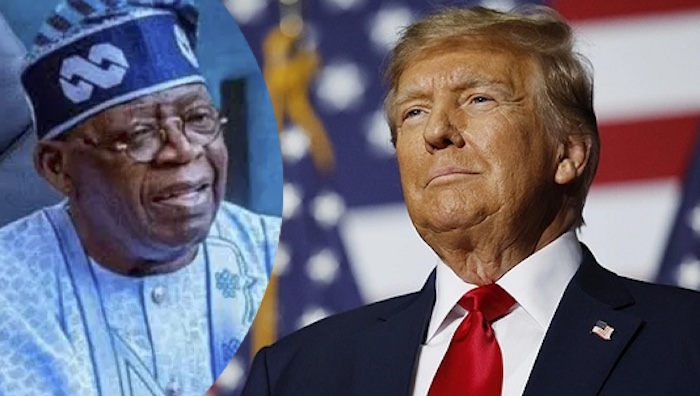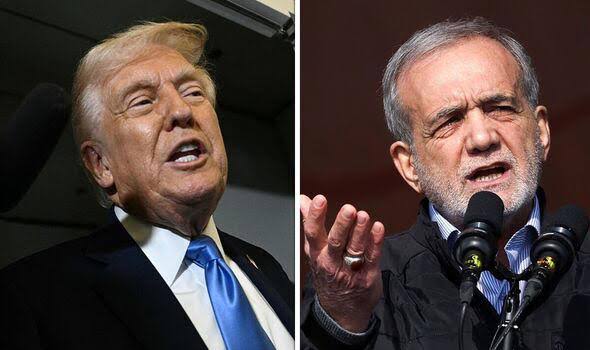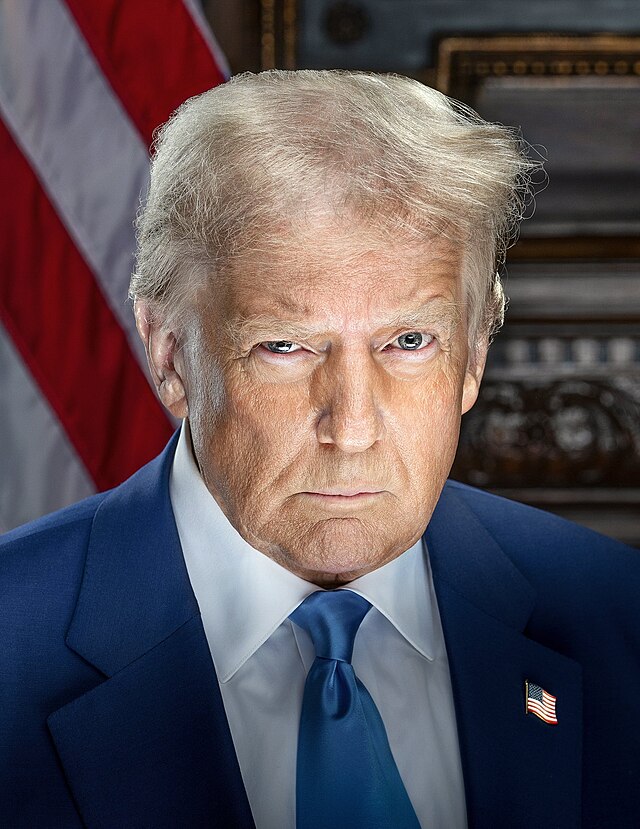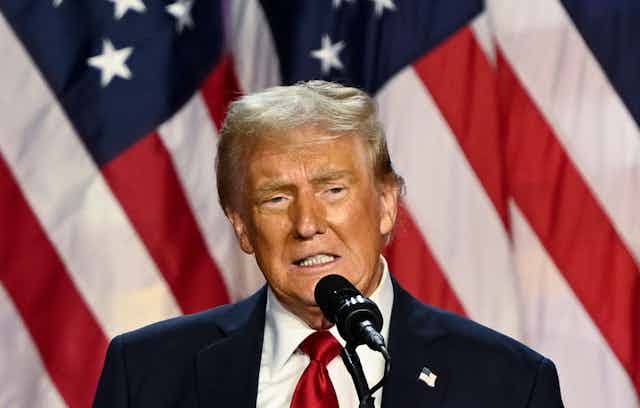President of the United States, Donald Trump, on April 2, 2025, announced the enforcement of sweeping tariffs on all goods imported into the country, a move that has placed over N323.96bn worth of Nigerian exports at risk.
Tagged the “Universal Baseline Tariff”, the policy imposes a 10 per cent levy on all imported products, with additional reciprocal tariffs for countries considered to maintain unfair trade practices.
While crude oil and energy-related goods are exempted from the new policy, Nigeria’s growing portfolio of non-oil exports to the U.S. may now face steep challenges.
Data from the National Bureau of Statistics for 2024 shows that Nigeria earned approximately N4.49tn from the export of crude oil and energy products to the United States.
These items, which include petroleum oils and gases, were the dominant export from Nigeria to the American market and have been spared from the fresh round of tariffs.
However, the country’s non-oil and non-energy exports—worth N323.96bn over the same period—are now subject to the new tariff regime.
A breakdown of Nigeria’s quarterly trade performance highlights how the country’s non-oil exports have grown in volume and variety.
In the first quarter of 2024, non-oil, non-energy exports to the U.S. were valued at N74.79bn.
These included flours and meals of soya beans worth N28.21bn, urea at N20.33bn, refined lead at N14.40bn, cashew nuts in shell at N11.09bn, and technically specified natural rubber valued at N769m.
These products represent key outputs in agriculture, fertiliser manufacturing, and industrial raw materials.
The second quarter recorded a significant rise in export volume to N123.23bn, driven largely by increased demand for urea, which soared to N86.54bn.
This was followed by refined lead at N21.88bn, flours and meals of soya beans at N9.44bn, and natural rubber at N4.37bn.
The sharp increase in urea exports within the period highlights Nigeria’s growing relevance in the global fertiliser market, particularly to U.S. agribusinesses.
In the third quarter, non-oil exports dipped slightly to N84.38bn. Urea remained the dominant product at N39.20bn, followed by refined lead at N18.94bn.
Cocoa beans made their entry into the list of major exports during the quarter, with shipments worth N14.48bn.
Soya meals added N6.78bn, while natural rubber rose to N4.99bn. This quarter marked Nigeria’s deeper integration into the global agricultural value chain, with cocoa and soya meal exports catering to U.S. processing industries.
By the fourth quarter, Nigeria recorded its lowest non-oil, non-energy export figure of the year, with total value falling to N42.55bn.
However, superior-quality cocoa beans led the quarter with N29.92bn. In addition, the country exported unwrought aluminium alloys and cathodes, both valued at over N4bn, alongside technically specified natural rubber at N4.37bn and minor shipments of other food preparations worth N61m.
The drop in total export value, despite the rise in cocoa bean shipments, reflects a narrowing product mix and declining volumes across other categories.
Altogether, Nigeria’s non-oil, non-energy exports to the U.S. stood at N323.96bn in 2024.
These products are now exposed to the newly announced 14 per cent tariff, which could alter their competitiveness in the U.S. market.
Urea, which accounted for N146.06bn in total exports during the year, stands as the single largest item at risk.
The fertiliser, produced domestically and exported at scale, may now face reduced orders from American buyers seeking cheaper sources elsewhere.
Cocoa beans, with a total export value of N44.40bn in the second half of the year, are similarly at risk.
The product plays a critical role in the global confectionery industry, and the U.S. remains a major destination for Nigerian cocoa.
With the tariffs in place, U.S. importers may shift demand to rival producers.
Refined lead, which earned Nigeria N55.23bn in exports in 2024, could also be affected, as the U.S. continues to promote domestic mining and refining operations.
Flours and meals of soya beans, with N44.43bn in exports, are part of global food and livestock feed supply chains.
Tariffs on these products may lead to reduced competitiveness and prompt buyers to consider alternative markets.
Similarly, natural rubber, with N14.5bn in exports, could lose its market edge to producers in other countries if cost becomes a determining factor under the new policy.
Although Nigeria’s crude oil and energy exports—totalling over N4.49tn in 2024—have been exempted from the tariffs, the country’s push for export diversification now faces a serious test.
Trump, in his address, described the tariff as a necessary step to bring back American manufacturing and curb the country’s dependence on foreign goods.
However, the fallout from the decision is expected to be global, with many developing nations like Nigeria now facing the challenge of reconfiguring their trade strategies amid rising protectionism from their largest partners.
Defending Trump’s tariff, the United States Trade Representative on Monday criticised Nigeria’s import ban on 25 categories of goods, claiming that the restrictions limit market access for American exporters.
This came shortly after President Donald Trump introduced tariffs on goods entering the US, with Nigeria facing a 14 per cent duty.
The USTR highlighted the impact of Nigeria’s import ban on various sectors, particularly agriculture, pharmaceuticals, beverages, and consumer goods.
The restrictions affect items such as beef, pork, poultry, fruit juices, medicaments, and alcoholic beverages, which the US sees as significant barriers to trade.
The agency argues that these limitations reduce export opportunities for US businesses and lead to lost revenue.
“Nigeria’s import ban on 25 different product categories impacts U.S. exporters, particularly in agriculture, pharmaceuticals, beverages, and consumer goods.
“Restrictions on items like beef, pork, poultry, fruit juices, medicaments, and spirits limit U.S. market access and reduce export opportunities.
“These policies create significant trade barriers that lead to lost revenue for U.S. businesses looking to expand in the Nigerian market,” the agency said via its X handle.
In 2016, Nigeria implemented the ban on these 25 items as part of efforts to control imports and stimulate local production.
Some of the banned items include poultry, pork, refined vegetable oil, sugar, cocoa products, spaghetti, beer, and certain medicines.
The Federal Government on Sunday acknowledged the adverse impact of the newly imposed tariffs by Trump on Nigeria’s oil and non-oil exports, which could potentially disrupt trade relations and affect the competitiveness of Nigerian products in the US market.
In a statement, Nigeria’s Minister of Industry, Trade, and Investment, Dr Jumoke Oduwole, responded to the tariff decision, admitting that the policy would undermine the competitiveness of Nigerian goods, especially in sectors reliant on market access and price competitiveness.
According to the minister, Nigeria’s exports to the United States have averaged $5–6 bn annually in the last two years.
Oduwole said, “A significant portion (of Nigeria’s exports) — over 90 per cent — comprises crude petroleum, mineral fuels, oils, and gas products. The second-largest export category, accounting for approximately 2–3 per cent, includes fertilizers and urea, followed by lead, representing around 1 per cent of total exports (valued at approx $82m).
“Nigeria also exports smaller quantities of agricultural products such as live plants, flour, and nuts, which account for less than 2 per cent of our total exports to the U.S.
“While oil has long dominated Nigeria’s exports to the US, non-oil products—many previously exempt under AGOA—now face potential disruption.
“A new 10 per cent tariff on key categories may impact the competitiveness of Nigerian goods in the U.S. For businesses in the non-oil sector, these measures present destabilising challenges to price competitiveness and market access, especially in emerging and value-added sectors vital to our diversification agenda.”
In a related development, Nigeria’s Minister of Finance and Coordinating Minister of the Economy, Wale Edun, said the recent 14 per cent tariff imposed by the United States on Nigerian exports will have a negligible effect on the Nigerian economy.
While recognising the seriousness of escalating global tariff conflicts, Edun emphasised that Nigeria remains relatively insulated from severe impacts, given the exclusion of oil and mineral exports—Nigeria’s primary exports to the US—from the tariff.
He highlighted the comparatively moderate 14 per cent tariff as favourable when placed alongside Vietnam’s 46 per cent and China’s 34 per cent tariffs.
“Nigeria’s exports to the US were N1.8tn, N2.6tn and N5.5tn in 2022-2024, respectively. Fortunately, oil and mineral exports accounted for 92 per cent, implying oil and mineral exports amounted to N5.08tn in value, while non-oil was just N0.44tn. Consequently, the tariff effect on exports is negligible if we sustain our oil and minerals export volume.”
However, Edun admitted the government’s economic management team is closely monitoring the global situation.
“We are going back to the drawing board to look at our budget all over again because we have to see what changes have been made in the assumptions that underlay the production of that budget and the reality over the first quarter and even projected into the future,” he said.
Economic experts said that the policy, which would raise the prices of goods and services for consumers, would weaken the standard of living, slow down manufacturing activities, hinder international trade and consequently weaken demand for Nigerian oil in the US, one of its key markets.
According to the National Bureau of Statistics, Nigeria’s trade with the United States reached a combined N31.1 N31.1tn in ten years between 2015 and 2024. An analysis of the foreign trade report showed that N16.4 tn was recorded as exports and N14.71 tn in imports, indicating a trade surplus of N1.64 tn.
A breakdown showed that Nigeria exported goods worth N344.27bn in 2015 and received N581.99bn as imports. In 2016, it increased to N1.03 tn in exports and N706.09 bn in imports. Exports surged to N1.73 tn in 2027, N1.094 tn in 2018, and N1.01 tn in 2019 before dropping to N382.19 bn in 2020 due to the pandemic. By 2021, exports increased to N800.34 bn, N1.82 tn in 2022, N2.61 tn in 2023 and N5.52 tn in 2024.
The Chief Executive Officer of Ecobank Transnational Inc., Jeremy Awori, earlier urged African nations to deepen trade among themselves as a buffer against the potential economic impact of new tariffs imposed by Trump.





